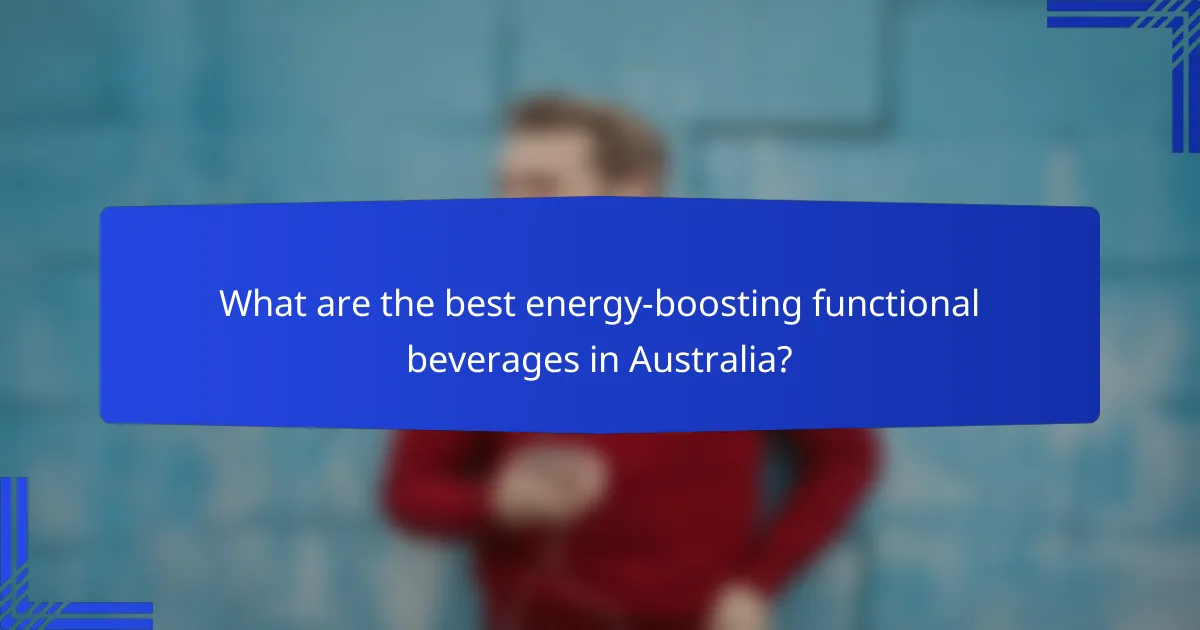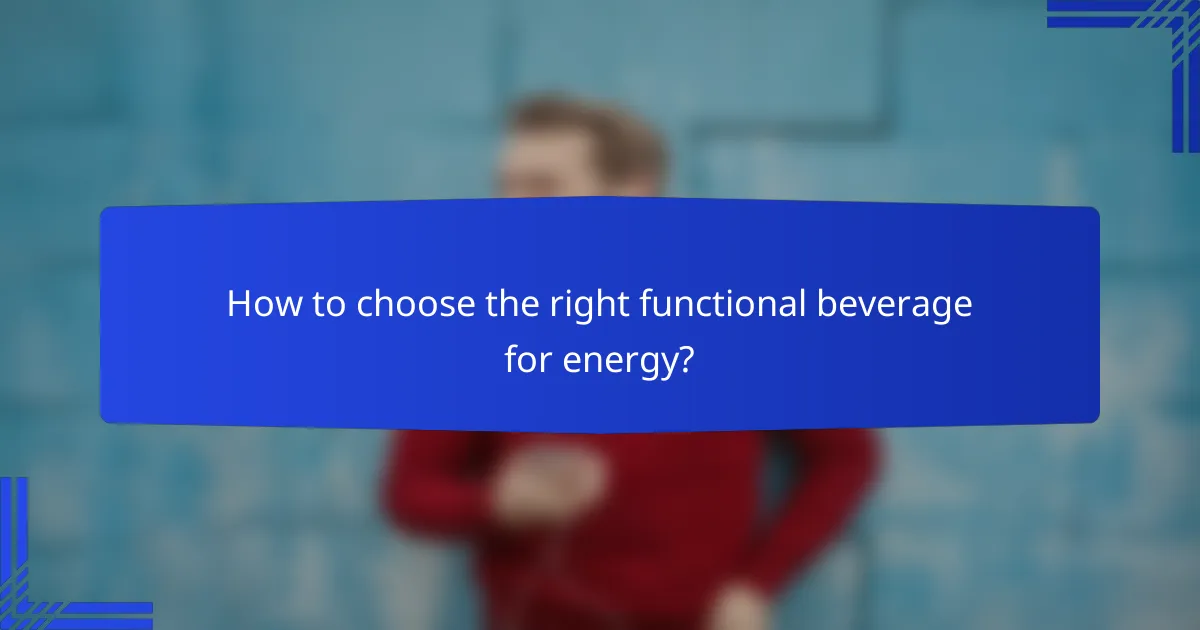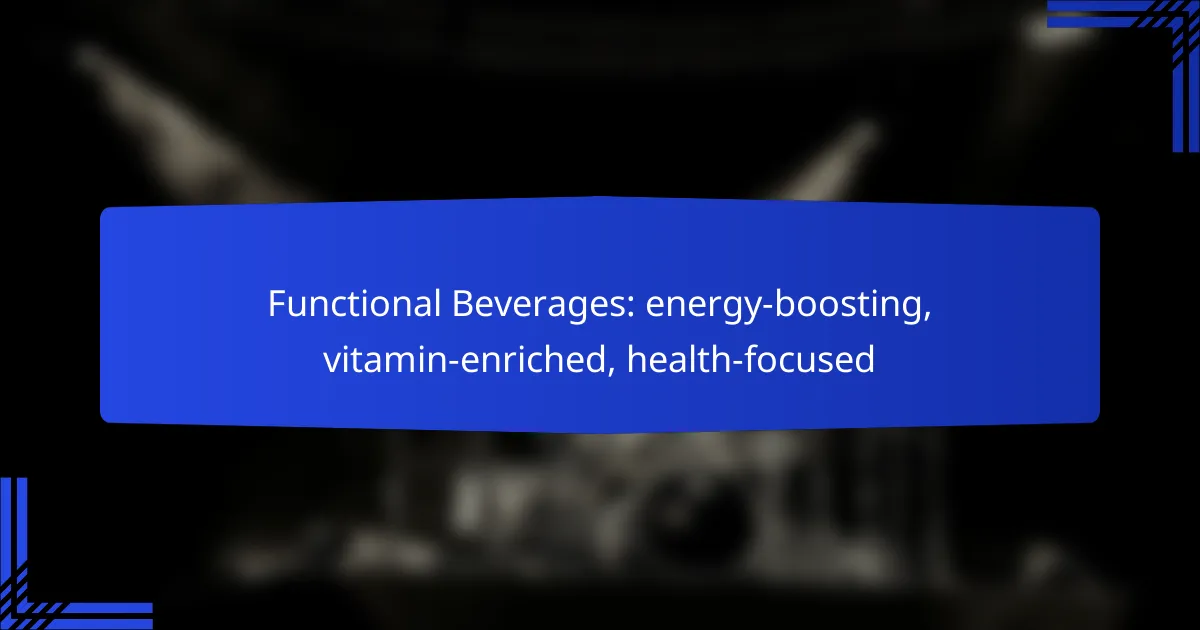Functional beverages are designed to provide energy, essential nutrients, and health benefits, making them a popular choice for those seeking to enhance their well-being. These drinks often combine ingredients like caffeine, vitamins, and electrolytes to boost physical and mental performance while supporting overall health. With a focus on health and wellness, they cater to a variety of needs, from energy enhancement to immune support.

What are the best energy-boosting functional beverages in Australia?
In Australia, some of the best energy-boosting functional beverages include popular brands that provide a quick energy lift and essential nutrients. These drinks often contain caffeine, vitamins, and other ingredients designed to enhance physical and mental performance.
Red Bull Energy Drink
Red Bull is one of the most recognized energy drinks globally and is widely available in Australia. It contains caffeine, taurine, and B vitamins, which work together to enhance alertness and concentration. A standard 250ml can typically provides around 80mg of caffeine, making it a popular choice for those needing a quick energy boost.
When consuming Red Bull, be mindful of your total caffeine intake, especially if you consume other caffeinated products throughout the day. Moderation is key to avoid potential side effects like jitters or insomnia.
V Energy Drink
V Energy Drink is another popular option in Australia, known for its fruity flavors and energizing effects. It contains caffeine, guarana, and B vitamins, which can help improve physical performance and mental focus. A 500ml can usually contains about 160mg of caffeine, providing a substantial energy lift.
While V Energy Drink can be effective for a quick boost, it’s important to consider its sugar content, which can be high in some varieties. Opting for sugar-free versions can help manage calorie intake while still enjoying the energy benefits.
Monster Energy
Monster Energy offers a wide range of flavors and formulations, making it a versatile choice for energy seekers. Each can typically contains between 160mg to 240mg of caffeine, depending on the variety. In addition to caffeine, Monster drinks often include taurine, ginseng, and B vitamins for added energy support.
Due to its high caffeine content, it’s advisable to limit consumption to avoid exceeding recommended daily limits. Always check the label for specific caffeine levels and be cautious if you have sensitivities to stimulants.
Ribena Energy
Ribena Energy is a unique option that combines the classic Ribena blackcurrant flavor with added energy-boosting ingredients. It contains caffeine and B vitamins, providing a refreshing way to increase energy levels. This drink is particularly appealing to those who enjoy fruity flavors without the typical energy drink taste.
Ribena Energy is often lower in caffeine compared to other energy drinks, making it a suitable choice for those looking for a milder energy boost. However, be aware of the sugar content, especially if you are monitoring your sugar intake.
Boost Juice Energy Smoothies
Boost Juice offers energy smoothies that blend fruits, vegetables, and energy-boosting ingredients like protein and vitamins. These smoothies are designed to provide a nutritious and energizing option, perfect for a quick breakfast or post-workout recovery. The caffeine content varies depending on the specific smoothie, but many options are caffeine-free.
Choosing a Boost Juice smoothie can be a healthier alternative to traditional energy drinks, as they often contain natural sugars and fiber. However, be cautious of portion sizes and added ingredients that may increase calorie counts.

How do vitamin-enriched functional beverages benefit health?
Vitamin-enriched functional beverages provide essential nutrients that can enhance overall health and wellness. These drinks often contain a blend of vitamins, minerals, and other beneficial compounds that support various bodily functions.
Enhanced immune support
Vitamin-enriched beverages can significantly boost immune function by supplying key nutrients like vitamin C, vitamin D, and zinc. These components play a crucial role in strengthening the immune system and may help reduce the risk of infections.
To maximize immune support, look for drinks that contain a variety of vitamins and antioxidants. Regular consumption, especially during cold and flu seasons, can be beneficial.
Improved hydration
Functional beverages often include electrolytes and vitamins that enhance hydration more effectively than plain water. Ingredients like potassium and magnesium help maintain fluid balance and support muscle function.
For optimal hydration, choose drinks low in sugar and high in electrolytes, particularly after exercise or during hot weather. Aim for beverages that provide a refreshing taste without excessive calories.
Increased energy levels
Many vitamin-enriched functional beverages are formulated to boost energy through ingredients like B vitamins, caffeine, or natural extracts such as ginseng. These components can help improve focus and reduce fatigue.
When selecting an energy-boosting drink, consider the caffeine content and how it fits into your daily intake. Look for options that provide sustained energy without the crash associated with high-sugar alternatives.

What are the key ingredients in health-focused functional beverages?
Health-focused functional beverages often contain a variety of key ingredients designed to enhance physical performance, boost immunity, and promote overall well-being. Common components include electrolytes, vitamins, adaptogens, and probiotics, each serving a specific purpose in supporting health.
Electrolytes
Electrolytes are essential minerals that help maintain fluid balance, nerve function, and muscle contractions. Common electrolytes found in functional beverages include sodium, potassium, magnesium, and calcium. These minerals are particularly important for hydration, especially after intense physical activity.
When choosing a beverage, look for those that contain a balanced mix of electrolytes to effectively replenish what is lost through sweat. Brands often highlight their electrolyte content, making it easier to compare options.
Vitamins B and C
Vitamins B and C play crucial roles in energy production and immune function. Vitamin B complex helps convert food into energy, while Vitamin C is known for its antioxidant properties and support for the immune system. Many functional beverages are enriched with these vitamins to enhance their health benefits.
Check the label for the specific types of B vitamins included, such as B6 and B12, as they contribute to various bodily functions. A good functional beverage may provide a significant percentage of the daily recommended intake for these vitamins.
Adaptogens
Adaptogens are natural substances that help the body adapt to stress and promote balance. Common adaptogens include ashwagandha, rhodiola, and ginseng. These ingredients are often included in functional beverages to support mental clarity and reduce fatigue.
When selecting a beverage with adaptogens, consider the specific benefits each adaptogen offers. For example, ashwagandha is known for its calming effects, while rhodiola may enhance physical endurance.
Probiotics
Probiotics are beneficial bacteria that support gut health and digestion. They can enhance the immune system and improve nutrient absorption. Many health-focused beverages incorporate probiotics to promote a healthy microbiome.
Look for products that specify the strain and number of live cultures, as these factors can influence effectiveness. A good functional beverage may contain billions of CFUs (colony-forming units) per serving to ensure a beneficial dose.

How to choose the right functional beverage for energy?
Choosing the right functional beverage for energy involves evaluating ingredients, aligning with personal health goals, and understanding caffeine levels. These factors will help you select a drink that effectively boosts your energy while supporting your overall well-being.
Assess ingredient labels
Start by examining the ingredient labels of functional beverages. Look for natural sources of energy such as green tea extract, guarana, or B vitamins, which can provide a more sustained energy boost compared to synthetic additives.
Avoid drinks high in added sugars or artificial ingredients, as these can lead to energy crashes. Aim for beverages with fewer than 10 grams of sugar per serving to maintain stable energy levels.
Consider personal health goals
Your personal health goals should guide your choice of functional beverage. If you’re looking to enhance athletic performance, opt for drinks that include electrolytes and amino acids.
For general wellness, consider beverages fortified with vitamins and minerals that align with your dietary needs. For instance, if you need more vitamin C, look for drinks that highlight this nutrient on the label.
Evaluate caffeine content
Caffeine content is a crucial factor when selecting an energy-boosting beverage. Most functional drinks contain varying levels of caffeine, typically ranging from 30 mg to 200 mg per serving. Determine your tolerance and daily limits to avoid jitters or sleeplessness.
For a mild boost, choose beverages with lower caffeine levels, while those needing a stronger effect may prefer options with higher caffeine content. Always check the label to understand how much caffeine you are consuming, especially if you consume multiple caffeinated products throughout the day.

What are the trends in functional beverages in Australia?
In Australia, functional beverages are increasingly popular, driven by consumer interest in health and wellness. Trends include a rise in plant-based options, a shift towards no-sugar beverages, and a strong focus on sustainability in production and packaging.
Increased demand for plant-based options
Consumers are gravitating towards plant-based functional beverages as they seek healthier alternatives. These drinks often include ingredients like herbal extracts, fruits, and vegetables, which are perceived to offer enhanced nutritional benefits.
Popular examples in Australia include beverages infused with adaptogens, such as ashwagandha and maca, which are believed to help manage stress and improve energy levels. Brands are responding by expanding their product lines to include more plant-based offerings.
Growth of no-sugar beverages
The no-sugar trend is gaining traction as health-conscious Australians look to reduce their sugar intake. Many consumers are opting for beverages that use natural sweeteners or are entirely unsweetened, aligning with broader dietary preferences.
Functional drinks that are low in sugar often feature flavors derived from fruits or herbs, providing taste without the added calories. This shift is prompting manufacturers to innovate with new formulations that maintain flavor while eliminating sugar.
Focus on sustainability
Sustainability is a key consideration for Australian consumers when choosing functional beverages. Brands are increasingly adopting eco-friendly practices, such as using recyclable packaging and sourcing ingredients from sustainable farms.
Many companies are also transparent about their supply chains, which resonates with consumers who prioritize ethical consumption. This trend not only helps the environment but also enhances brand loyalty among environmentally conscious buyers.

What are the potential risks of consuming functional beverages?
Consuming functional beverages can pose several risks, including excessive intake of certain nutrients, potential interactions with medications, and reliance on these drinks for health benefits. It’s essential to be aware of the ingredients and their effects on your body.
Excessive Nutrient Intake
Functional beverages often contain high levels of vitamins, minerals, and other additives. Consuming these drinks in large quantities can lead to nutrient overload, which may cause adverse effects such as nausea, headaches, or digestive issues. For example, excessive vitamin C can result in gastrointestinal discomfort.
Interactions with Medications
Some functional beverages may interact with prescription medications, potentially reducing their effectiveness or causing harmful side effects. For instance, energy drinks containing caffeine can amplify the effects of certain stimulants, leading to increased heart rate or anxiety. Always consult with a healthcare professional if you are on medication and considering these drinks.
Overreliance on Functional Beverages
Relying too heavily on functional beverages for health benefits can lead to neglecting a balanced diet. While these drinks can supplement nutrition, they should not replace whole foods that provide essential nutrients. Aim for a varied diet rich in fruits, vegetables, and whole grains, and use functional beverages as an occasional boost rather than a primary source of nutrition.
